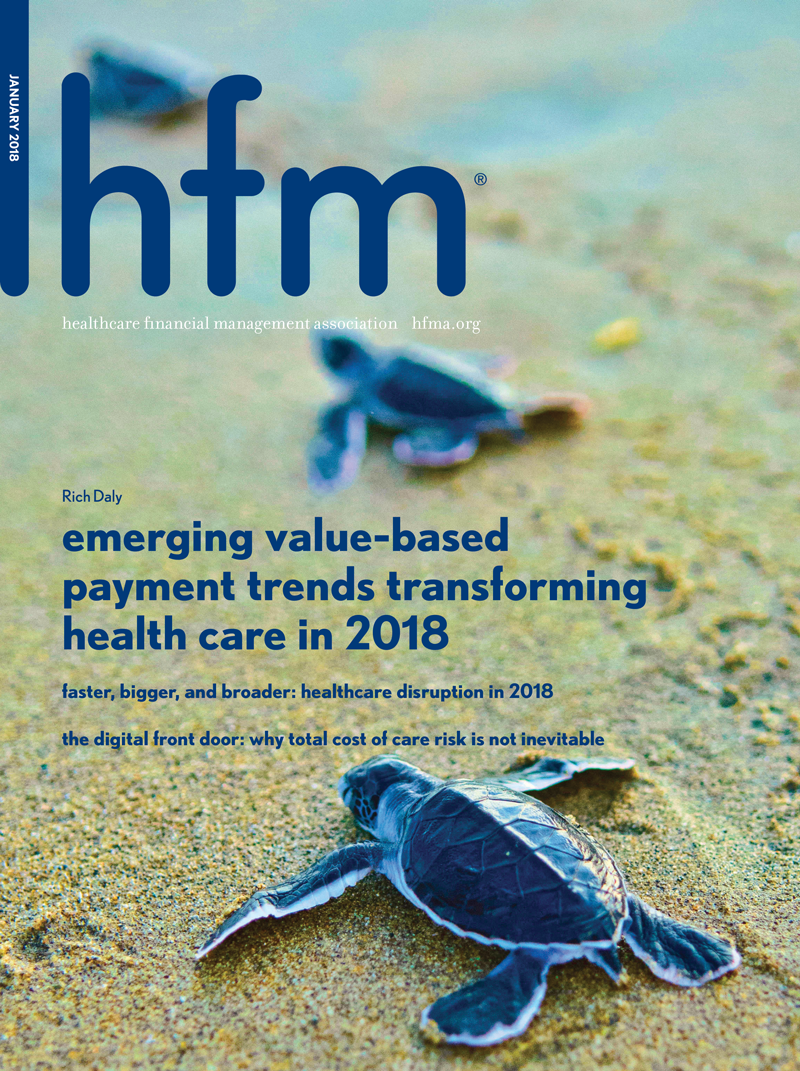
Cover Story
Emerging Value-Based Payment Trends Transforming Health Care in 2018
Hospitals and health systems plan a range of care delivery innovations in 2018 to help them reach more of the quality improvement goals of various payment models.
By Rich Daly
From the President’s Desk
|
Figure: exit rich text editor to add content |
Expanding on thoughts in his January 2018 column in hfm, HFMA President and CEO Joseph J. Fifer, FHFMA, CPA, talks about healthcare affordability, disruptors, and implications for stakeholders. |
Participating in Bundled Payment Initiatives
Tamira Harris, PhD, MBA, MSN, business adviser for Change Healthcare, takes a look at how healthcare entities can get started with bundled payment initiatives, including care design and delivery.
Early Edition
When Push Becomes Pull: The Next Phase of the Transition to Value
The healthcare industry’s transition to value-based payment will likely continue, driven by physician interest in advanced alternative payment models.
By Chad Mulvany, FHFMA
Healthcare Matters
High Discount Health Plans: Right for the Consumer, but What About PFS?
Organizations writing off more and more patient debt may want to explore new avenues for collaboration.
By Jeff Helton, PhD, FHFMA, CMA, CFE
Leading Change Effectively
Healthcare organizations implementing changes, whether driven by outside or inside influences, must consider how such change will impact employees and organizational culture.
By Paul Selivanoff, CPA
Features
Commentary
The Digital Front Door: Why Total Cost of Care Risk Is Not Inevitable
Rapid technological advancements have savvy health plans and provider organizations considering how to succeed in a value-based system.
By Paul Spencer
Faster, Bigger, and Broader: Healthcare Disruption in 2018
Hospitals and health systems are challenged to respond strategically to disruptive new competitors and technologies that are entering their markets and threaten to dramatically transform the industry.
By Kenneth Kaufman
Change for the Delta: A Process for Strategic Planning in a Challenging Market
A hospital catering to a largely underserved population is working to keep itself financially viable by working up a long-range strategic plan.
By Scott Christensen and John Mallia
Focus Area
Revenue Cycle
Responsive Payment Support: Finding the Right Balance for Patients With HDHPs
With growing numbers of self-pay patients face difficulties in meeting their payment obligations, healthcare providers can assist them by providing responsive payment support, including offers of tailored payment plans.
By John Talaga
Columns
From the Chair
Let’s Have a Think
Healthcare finance leaders should think deeply about what they can do to meaningfully contribute to advancing meaningful improvements, including transformed leadership structures, within the nation’s healthcare system.
By Carol A. Friesen, FHFMA, MPH
From the President
Pick Up the Pace (or Forfeit the Race)
HFMA President and CEO Joe Fifer discusses recent healthcare industry merger news in the context of consumerism and collaboration imperatives.
By Joseph J. Fifer, FHFMA, CPA
Eye On Washington
The Continued Move to Greater Integration and Consolidation
The nation’s hospitals face a potential threat of being excluded from the healthcare delivery system based on recent merger and acquisition activity in the industry.
By Gail R. Wilensky, PhD
Business Intelligence
Preparing for Post-Live Optimization for an EHR Conversion
Although electronic health record system conversions are complex, mapping a timeline for optimization can help health systems meet their short- and long-term goals for the new system.
By Andrew Hancock and Bryan Chamberlin
Healthcare Reform
The Changing Health Policy Debate and the Unyielding Imperative of Value-Based Care
Republican efforts to repeal and replace the Affordable Care Act have been temporarily put on hold while the party focuses on tax reform.
By Ken Perez
On Point
The Year Ahead: What 2017 ACA Changes Could Mean for 2018 and 2019
Healthcare providers can expect an impact in 2018 from changes made by the Trump administration in 2017 that could lead to a decline in the number of Americans with health insurance and an increase in health plans with fewer benefits.
By Lia Winfield, PhD
Departments
Data Trends
Analyzing the Frequency of Changes Among Worksheets in Medicare’s HCRIS
A study ranked worksheets providers use in filing Medicare cost reports by the frequency with which they needed to be updated, highlighting some areas requiring special attention from individuals charged with completing the cost reports.
Advertising
Trendsetter
Embracing New Technologies to Reimagine the Revenue Cycle
A key element in reimagining healthcare delivery and reimbursement is a robust technology infrastructure that seamlessly links clinical and financial operations and allows consistent and effective exchange of information among key stakeholders in a patient’s care—both providers and payers. Change Healthcare is striving to address these gaps by leveraging its Intelligent Healthcare Network to innovate in the revenue cycle space.





